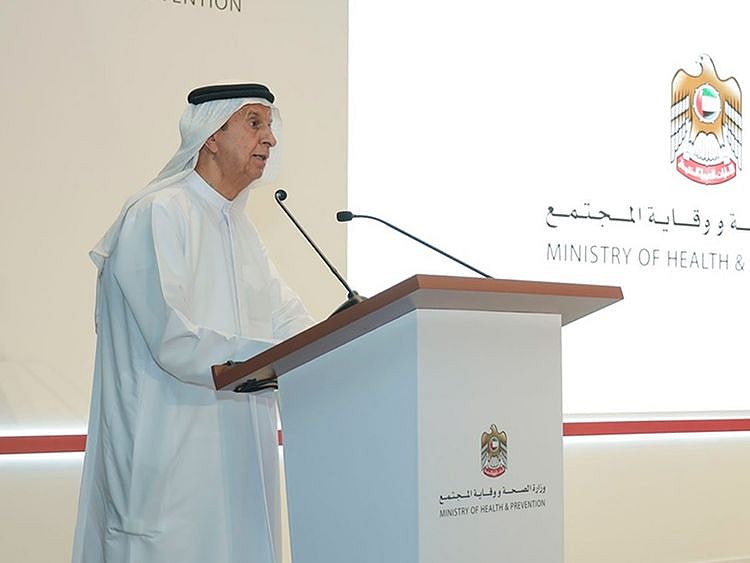UAE introduces new protocol to cut deaths from cardiovascular diseases
Initiative aims to reduce the mortality rate from cardiovascular diseases by 33% by 2030

Dubai: The UAE has introduced a new health protocol to predict heart attacks and strokes early and reduce the mortality rate from cardiovascular diseases by one third by 2030, according to the Ministry of Health and Prevention (MoHAP).
The ministry revealed its goals related to combatting cardiovascular diseases while announcing the outcomes of its transformational initiative, ‘Your Pulse’, a national system for the early detection of cardiovascular disease risk, along with the results of the 2023-2024 National Campaign for Early Detection of Hypertension.
Cardiovascular disease is one of the leading causes of death in the UAE, with symptoms in patients often appearing much earlier than their counterparts in other developed nations.
“The Your Pulse project has implemented an early intervention system for individuals aged 40 and above who are at high risk, providing medical advice and essential treatments,” the ministry said.
MoHAP said that the project covered 80 per cent of its target demographic and successfully reached 95 per cent of people who visited healthcare and check-up centres run by government health authorities.
Standardised protocol
Additionally, the ministry said a standardised protocol for calculating the Framingham Cardiovascular Risk Score has been adopted across all government health facilities in the country.
“This protocol, linked to national and global health indicators, aims to reduce the mortality rate from cardiovascular diseases by 33 per cent by 2030,” the ministry revealed.
The Framingham Cardiovascular Risk Score is a tool that helps doctors predict a person’s risk of developing cardiovascular diseases, such as heart attack or stroke, over a specific period (usually 10 years). This is assessed by looking at factors like age, levels of cholesterol, blood pressure, diabetes and smoking habits. Using this information, they can take steps to lower the risk of heart attack or stroke.
By adopting a standard method to calculate this score across all health facilities, doctors can consistently identify high-risk patients and provide early treatment or lifestyle changes. This will help reduce heart attacks and strokes and deaths from cardiovascular diseases, contributing to the goal of cutting one-third of deaths by 2030.
Hypertension campaign benefits 140,000
Another initiative that the ministry has implemented to support the goal of cutting cardiovascular mortality is the National Campaign for Early Detection of Hypertension.
Conducted between June and August 2023-2024, the campaign benefitted 140,000 citizens and residents, the ministry said. The campaign identified 13.2 per cent of participants as being aware of their hypertension and actively receiving treatment, with four per cent being newly diagnosed cases. The campaign also noted correlations between hypertension, obesity, physical inactivity, and all forms of smoking, MoHAP pointed out.
Together, these initiatives highlight the UAE’s commitment to transforming healthcare through prevention, education, and the promotion of healthier lifestyles.
Dr. Hussain Abdul Rahman Al Rand, Assistant Undersecretary for the Public Health Sector highlighted that the results of “Your Pulse” project and the National Campaign for Early Detection of Hypertension will strongly support the government’s new strategies, which focus on short-term, targeted projects that deliver real results, instead of relying on traditional ministry-led programmes.
In fact, the ministry has entered into multiple partnerships to combat risk factors of non-communicable diseases such as obesity, diabetes and hypertension by promoting a healthy and active lifestyle and early detection.
“This approach not only focuses on the central role of transformative projects in future government work but also aims to build a healthier and more sustainable future for coming generations in line with “We the UAE 2031” Vision,” he stated.
Dr Al Rand stressed that ensuring cardiovascular health will help reduce premature mortality. And this can be achieved by promoting prevention, early diagnosis, and advanced healthcare for all.
The results of the initiatives will also contribute to shaping future health policies, directing resources in line with anticipated health needs, and building a sustainable society where everyone enjoys a high quality of life, he further said.
Also Read
World Mental Health Day: The toll of traffic congestionSharjah mulls to launch health insurance for all residents including elderlyDubai’s new strategy seeks to double number of mental health specialistsAbu Dhabi forum highlights family’s role in addressing mental health challengesNational plan
The ministry, in collaboration with its partners, has developed a national plan to manage preventive and community health programmes aimed at enhancing quality of life on a national scale, pointed out Dr Buthaina Bin Belaila, head of the Non-Communicable Diseases and Mental Health Section at MoHAP.
“The plan focuses on building the skills of healthcare professionals and educating the public on maintaining a healthy lifestyle, which includes regular physical activity, eating nutritious food, reducing salt intake, and quitting smoking,” she explained.
The results of the MoHAP initiatives were announced during an event hosted by the ministry in Dubai, in collaboration with partners from government, private, and telecommunications sectors.
Sign up for the Daily Briefing
Get the latest news and updates straight to your inbox
Network Links
GN StoreDownload our app
© Al Nisr Publishing LLC 2026. All rights reserved.